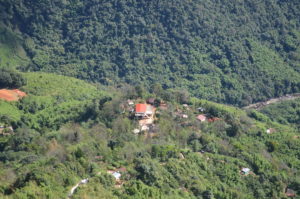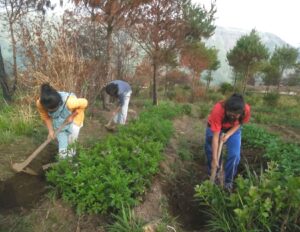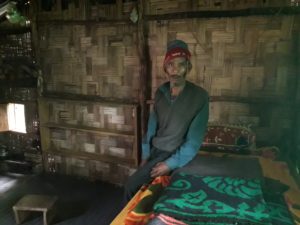Escaping from the hum-drums of the urban life a journey to the rustics of Mawkade village (Mawthadraishan C&RD Block, Eastern West Khasi Hills) doused us in lustful green pastures and agricultural fields stretching over myriad acres greeting us with thick clouds preparing for the heavenly outpour to meet Bah Bosswell Marwein and several other farmers. Bah Marwein narrated, “Agriculture has been the backbone of our family for centuries. People in Mawkade village, to this day is dependent on agriculture as the main source of income. We cannot imagine life without agriculture”. In conversing with NESFAS, Bah Marwein shared how in the years 2015 onwards he started using chemical fertilizers, pesticides and fungicides like urea and DAP (Diammonium phosphate) in his kitchen garden. These are easily available in the market. He reiterated, “The usage of these chemical fertilizers was very profitable for me as I was not only producing vegetables but I was also supplying it to the other villages, especially during the Covid-19 lockdown period, and since I was one of the few who got the permission to move around, I made quite a profit.” He frowned and added, “However, there were also times when I incurred a heavy loss as the investment on the purchase of these is also very high. And it was only when NESFAS came to our village in December 2021 that I was made aware of how harmful these chemical fertilizers are to the soil, plants, animals, water bodies and my fellow human beings.”
NESFAS in collaboration with the Meghalaya Basin Management Agency (MBMA) and supported by the World Bank have initiated a project called “Empowering indigenous communities through Agroecology Learning Circles (ALCs) for resilient, integrated and innovative natural resource management”. Bah Bosswell Marwein was delighted of the new venture as an ALC member and formed a group of farmers with a mission to alleviate traditional farming and healthy living. With his ALC group from Mawkade, the 12 members focused on the prevention and control of soil erosion by using ‘sla la met’ or packing leaves.
“I also had the opportunity to share my story to an audience of more than 200 fellow farmers and other members in the sector,” Bah Boswell shared happily as he mentioned his recent participation at the State Level Workshop on Agroecology Learning Circles (ALC) and Natural Resource Management that was held in Shillong.
It has been a while since we last communicated. On a follow-up, he smiled while conversing and said, “I have stopped using and supplying harmful chemicals and adopted the organic way of life.” The road is challenging for some farmers as you do get tempted when reminded of the good money that comes from Chemical fertilizers. In the words of Bah Marwein, “Money cannot buy good health; money cannot buy life.” In his small little effort, Bah Marwein took a gigantic leap to venture back to his traditional roots of farming with passion, and commitment and rekindle the magic of farming organic.
When we returned back, we saw little children on the paddy fields while the others were running beside our car with “bye-bye” chants at the top of their lungs. We were overwhelmed by the gesture, but what made us most glad was that we were leaving behind one healthy village to venture into another.





